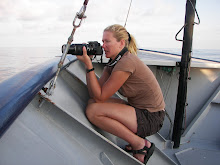 We began our fifth experiment yesterday in an eastern region of the Ross Sea known as the South central Polynya (much of our work was previously conducted in the western section). The polynya (an ice-free region) occurs seasonally and is dominated by a small phytoplankton known as Phaeocystis, which is considered to be – because of its small size and its ability to form gelatinous colonies –inedible to many zooplankton species. This experiment will help us determine what feeds on this small alga and if the structure of the microbial food web here differs as a result.
We began our fifth experiment yesterday in an eastern region of the Ross Sea known as the South central Polynya (much of our work was previously conducted in the western section). The polynya (an ice-free region) occurs seasonally and is dominated by a small phytoplankton known as Phaeocystis, which is considered to be – because of its small size and its ability to form gelatinous colonies –inedible to many zooplankton species. This experiment will help us determine what feeds on this small alga and if the structure of the microbial food web here differs as a result.The other scientific team onboard is conducting seismic surveys of the region in order to distinguish the sediments that lie on and beneath the ocean floor. To do so, the boat travels at slow speeds in a relatively straight trajectory, breaking ice as necessary. This provides an excellent opportunity for wildlife viewing. We have been particularly fortunate in seeing emperor penguins in this region. Yesterday we passed a large ice floe with over 20 emperors onboard. The sight alone was incredible, but to add to the splendor, several of them could beheard calling in that classic penguin language you hear in "March of the Penguins" or any nature special. I even saw a juvenile penguin that was in the process of molting from its very bushy grey down to its sleek black adult feathers. Minke whales have been abundant here as well, and the seismic team must stop their “acoustic guns” whenever they are in the vicinity for fears that the large underwater sound pulses created by the guns may damage their very sensitive inner ears. For this reason, a scientist is always assigned on “marine mammal observation” and a hydrophonehas been deployed to listen underwater for any signs of their presence. We have spanned now the entire width of the Ross Sea. In the dense ice floes, I have even seen the rare Ross Seal, a shy inhabitant ofthe deep pack ice, whose sightings are enhanced through the use of large icebreakers such as theNathaniel B. Palmer. My sighting has caused one veteran crew member to rub my arm seeking some of my “Ross Seal mojo”. I guess all the marine mammal rehab work back home has paid off for me in my seal karma.

In other news, we had regular updates of the Superbowl game from phone calls made home, while we set up our experiment yesterday. All of the Stony Brook scientists applauded when the Giants took the title. It sounded like an incredible game to miss, but what memories I will have when I look back on the game in many years to come. Go Giants!
.jpg)





No comments:
Post a Comment